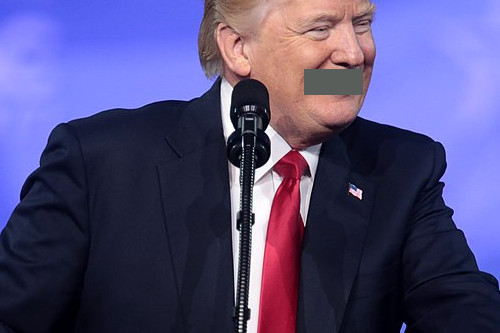
In case you haven’t heard (oh, yes, you’ve heard), former US president Donald Trump faces criminal charges in various jurisdictions, relating to everything from his business practices to his handling of classified documents to his conduct regarding the outcome of the 2020 presidential election.
Comes now special counsel Jack Smith, in one of those prosecutions, asking judge Tanya Chutkan to issue a “gag order” under which Trump would be forbidden to publicly make “certain prejudicial extrajudicial statements.”
I tend toward a dim view of “gag orders” in general, but this proposal is particularly silly and counter-productive. It embodies the same level of evil as any other demand that someone’s public speech be curtailed, but it’s also likely to be ineffectual, or even actually damage Smith’s efforts to convict Trump. To steal a quote incorrectly attributed to French diplomat Charles-Maurice de Talleyrand-Perigord concerning an 1804 trial and execution, “it’s worse than a crime, it’s a blunder.”
Smith doesn’t tell us anything we don’t know in attempting to justify the request.
Trump, prosecutors claim, “knows that when he publicly attacks individuals and institutions, he inspires others to perpetrate threats and harassment against his targets.” His “extrajudicial statements are intended to undermine public confidence in an institution — the judicial system — and to undermine confidence in and intimidate individual — the Court, the jury pool, witnesses, and prosecutors.”
Anyone who’s followed Trump’s career in general or his recent legal troubles in particular knows all that to be true.
“Gagging” him, even if he complied with the order (don’t bet the ranch on that happening, if you want to keep the ranch) wouldn’t end, or even reduce, the threats or attempts to intimidate.
Trump has plenty of proxies, most of whom he wouldn’t have to personally ask (and probably doesn’t even personally know), to keep that kind of thing up on his behalf.
Why give him plausible deniability? And why try to prevent him from “tainting the jury pool,” when any such “tainting” will likely be to the prosecution’s benefit rather than his?
Trump never shuts up. Many people believe, with good reason, that he CAN’T shut up. Every time he’s accused of something, he proudly owns it, pronounces it not just non-criminal but “perfect,” whines that he’s just the little guy facing persecution, and issues open threats against anyone and everyone involved.
How are those chosen as jurors likely to take those threats? As evidence that he should be sent on his merry way to keep doing the same things he’s been doing, or as evidence that perhaps a stiff set of iron bars between him and them is called for?
Because these cases are all inherently political, he’s almost certain to hang any jury anyway — at least one out of every 12 Americans uncritically buys whatever “AS SEEN ON TV!” goop he’s selling.
But sweeping those threats under the rug will give some otherwise reasonable people time to forget about them. And it’s always better to err on the side of free speech anyway.
Let him talk.
Thomas L. Knapp (Twitter: @thomaslknapp) is director and senior news analyst at the William Lloyd Garrison Center for Libertarian Advocacy Journalism (thegarrisoncenter.org). He lives and works in north central Florida.
PUBLICATION/CITATION HISTORY


